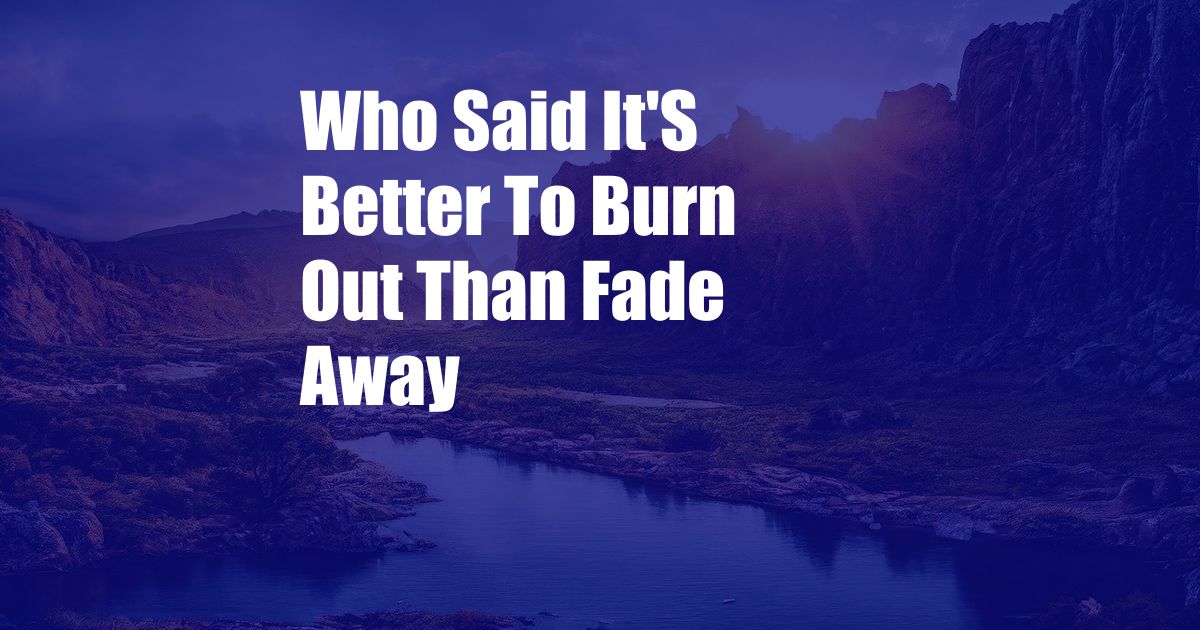
**A Blaze of Glory: The Allure and Peril of Burning Bright**
In the annals of rock and roll history, Neil Young’s anthem “My My, Hey Hey (Out of the Blue)” reverberates with a poignant exhortation: “It’s better to burn out than fade away.” This enigmatic phrase has sparked countless debates, stirring reflections on the nature of success, passion, and the human spirit.
The allure of burning out stems from a deep-seated human desire to leave an indelible mark on the world. It’s a siren call to live life on the edge, pushing oneself to the limit in pursuit of greatness. Like moths drawn to a flame, some individuals are driven by an unquenchable thirst for fame, recognition, and the intoxicating rush of adrenaline.
**The Price of Brilliance**
**Emotional and Physical Toll**
However, the pursuit of a blazing glory can come at a heavy cost. Burning brightly often exacts a profound emotional and physical toll. Endless hours of relentless effort can lead to burnout, depression, and anxiety. Relationships can suffer as personal life is sacrificed on the altar of ambition. Health can deteriorate as the body and mind struggle to keep pace with the inferno within.
The history of art, music, and literature is replete with tales of individuals who burned out prematurely. Vincent van Gogh, tormented by mental illness, cut off his ear and died at the age of 37. Jim Morrison, the enigmatic rock star of The Doors, succumbed to alcoholism at 27. John Keats, the Romantic poet, passed away from tuberculosis at 25, leaving behind a legacy of exquisite beauty and unfulfilled promise.
**The Meaning of True Legacy**
While burning out can leave a dramatic and unforgettable mark, it’s important to question whether it’s the only measure of a meaningful life. True legacy is not simply about a spectacular upsurge but about the cumulative impact of one’s actions and creations. It’s about inspiring others, making a difference in the world, and creating a lasting ripple effect.
Consider the work of Mahatma Gandhi, who dedicated his life to nonviolent resistance and the pursuit of equality. Albert Einstein, who revolutionized our understanding of the universe through his groundbreaking theories of relativity. Mother Teresa, who spent her life serving the poor and destitute in Calcutta. Their legacies live on, not because they burned out in a blaze of glory, but because they lived with purpose and left an enduring contribution to humanity.
**Tips for a Balanced Approach**
The path of wisdom lies somewhere between the extremes of burning out and fading away. It’s about finding a harmonious balance between passion and self-preservation. Here are some tips for navigating this delicate balance:
- Know your limits: Recognize the boundaries of your physical and mental endurance. Set realistic goals and take breaks when needed.
- Cultivate self-care: Prioritize your well-being by engaging in activities that nurture your body and mind, such as exercise, meditation, and spending time in nature.
- Build a support system: Surround yourself with people who understand and support your ambitions but also encourage you to maintain a balanced lifestyle.
- Embrace resilience: Learn to bounce back from setbacks and challenges. Failure is not a sign of weakness but an opportunity for growth.
Remember, burning out is not synonymous with success. True achievement is a marathon, not a sprint. By cultivating a mindset of sustainability and self-care, you can live a life filled with purpose and passion without sacrificing your well-being.
**Frequently Asked Questions**
Q: What’s the significance of Neil Young’s quote “It’s better to burn out than fade away”?
A: The quote reflects the allure and danger of pursuing success and fame at all costs. It raises questions about the nature of legacy and the balance between ambition and self-preservation.
Q: Who are some historical figures who exemplify the consequences of burning out?
A: Van Gogh, Morrison, and Keats are notable examples of individuals whose brilliant careers were cut short by burnout, depression, and illness.
Q: What are some practical tips for achieving a balanced approach to success and well-being?
A: Setting realistic goals, prioritizing self-care, building a support system, and developing resilience can help individuals avoid burnout while still pursuing their passions.
**Conclusion**
The question of whether it’s better to burn out or fade away remains a captivating enigma. While the allure of a blazing glory is undeniable, the path of wisdom lies in finding a sustainable equilibrium between ambition and well-being. True legacy is not measured by a fiery demise, but by the lasting impact one makes on the world and the lives they touch along the way.
Are you interested in learning more about the fascinating topic of burning out vs. fading away? Share your thoughts and questions in the comments below!